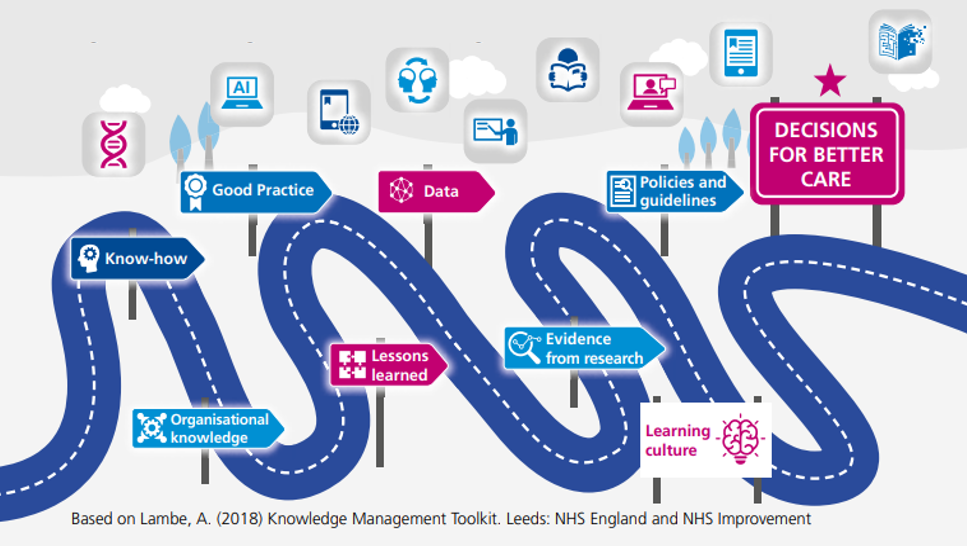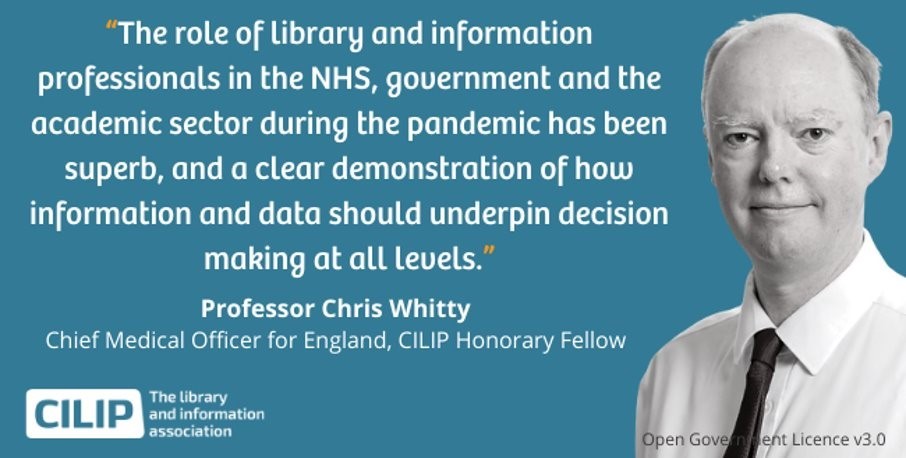Mobilising Evidence and Knowledge – a lasting gift
2021 has been an exciting year for our work around mobilising evidence and knowledge. We have continued to raise our profile and were delighted that NHS library and knowledge professionals were recognised by Professor Chris Whitty, Chief Medical Officer for England. December is a traditional time to reflect and also look forward to what is to come. We would like to take this opportunity to summarise and recycle some previous thinking and give you a flavour of some of the work underway.
In their article of 2020 Alison Day and Louise Goswami described the planning, prioritisation and delivery of work by Health Education England to transform the role of NHS librarians to become business-critical in mobilising evidence and organisational knowledge across the NHS in England. The paper outlined future plans and identified the challenge of,
“positioning NHS knowledge specialists to develop and implement strategies working with organisations to create strong learning cultures… leading to the breakdown of silos enabling evidence and knowledge to truly drive change across the NHS in England.”
This challenge is picked-up in the refreshed Knowledge for Healthcare strategy of 2021 where the strategic intention for mobilising evidence and knowledge is stated that:
Healthcare organisations, services and systems effectively mobilise evidence, learning, knowledge and ‘know how’ to enable evidence-based policy and practice.
Specific outcomes are defined as:
-
Healthcare organisations, services and systems are effective in mobilising evidence and internally generated knowledge
-
Healthcare staff Apply and use evidence, Build know how, Continue to learn and Drive innovation
-
Healthcare knowledge and library staff manage and mobilise evidence and knowledge
So, what do we mean by mobilising evidence and knowledge?
There are many terms that are used interchangeably to describe knowledge mobilisation:
Knowledge management, knowledge sharing, shared learning, learning lessons, connecting people, sharing ‘know-how’, knowledge transfer, spread and adoption, knowledge translation and even evidence-based medicine
The Blog Post, K is for Knowledge and M is for Mobilisation aimed to develop a working definition based on the easy read version of the Knowledge for Healthcare Strategy:
“Getting the right information from different places and sharing it” and this “right information” can be from reports, research, the internet and from the things people know but haven’t written down. People can then use this knowledge to help inform their decisions and actions.
We have been encouraged by our colleague Susan Smith in her blog post, Knowledge as Data, to consider broadening this definition further to include how we can apply our skills to mobilising data.
The image adapted from the Knowledge Management Toolkit by A. Lambe sums this up neatly:

Launching a digital Knowledge Mobilisation Self-Assessment Tool
A highlight of 2021 was the launch of the digital Knowledge Mobilisation Self- Assessment Tool which improves the experience of healthcare staff working with knowledge specialists to identify how well they are using evidence and knowledge and where there are opportunities to develop.
Use of the tool will enable teams to continually improve upon how they maximise the use of evidence and organisational knowledge to aid informed decision making, which in turn will make a tangible difference to healthcare outcomes.
Action plans resulting from analysis of the self-assessment results may lead to more people undertaking literature search skills development, considering how they evaluate the evidence they are using or adopting various tools to share and use learning. To help with this, work is underway to refresh the How to Search the Literature e-learning, e-learning about critical appraisal techniques has been commissioned and there are plans for 2022 to refresh and expand the NHS Knowledge Mobilisation Framework.
Raised awareness of our work
During November, the annual showcase, KNOWvember, focused on growing connections and a wide range of learning opportunities were provided for the library and knowledge workforce. Social media was also used extensively and many NHS libraries used November as an opportunity to talk about their work – highlighting the benefits our expertise brings to healthcare. We are currently testing hypotheses around measuring the impact of knowledge mobilisation activities which will lead to building evidence about the value of this work.
Plans are underway to refresh the successful #AMillionDecisions initiative in 2022. To update the endorsements and examples of impact that have raised the profile of our work and to place more of an emphasis upon raising the profile of your local services.
Whilst in this global pandemic the expertise of our profession has been recognised as making a valuable contribution. Ensuring the right evidence and knowledge are mobilised at the right time and in the right place, making this straightforward for people to use and contributing to a learning culture is critical.
